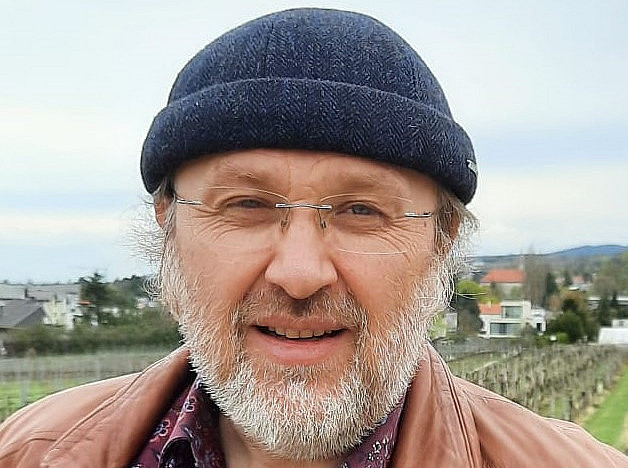Perspectives
You have been Professor of Translation Studies at the University of Graz since 2020 and are the driving force behind the department's research area on Translation and Digital Change. What has been the biggest challenge in your work since you started this position?
To be honest, the biggest challenge so far has, unfortunately, not been an aspect of my research. I have been Head of the Department since March 2021, and in addition to the many organisational tasks this entails, a large part of my duties in this position involve ensuring that the department is equipped for the digital future. These tasks and the fact that I was a complete newcomer to Graz when I took on the position have proven to be the biggest challenges in my work so far. As far as research is concerned, I try to use my work to spark critical debate on the use and social impact of language and translation technologies, for example with regard to widespread, often unreflected use of machine translation in the public sphere today.

Your research interests include the unequal global distribution of power, anti-democratic developments and the associated denial of global climate change. What is the connection between translation studies and such topics?
Translation studies is a discipline that has been firmly established for decades and sees itself as a link between the most diverse scientific fields. There are countless links, for example, to literature and linguistics, cultural and social sciences, but also to more seemingly removed fields such as computer and cognitive sciences.
At its core, this question relates to what we translation scholars call a translation-sociological problem. Translation, like all forms of communication, has a lot to do with power and ideology. When it comes to translation and interpreting processes, individual and group interests usually play a significant role. Translation always takes place via unequal power relations, usually to the detriment of the "weaker" party. At a concrete level, for example, community interpreting in asylum procedures in most countries is not yet professionalized to the extent that the concerns of asylum seekers can be negotiated in a manner which is translationally and ethically satisfactory.
On a global level, "strong" cultures – such as the Anglophone English-speaking world – tend to pay less attention to the cultural characteristics of other countries and cultures. This is often reflected in literary translations into English that ignore cultural differences. It is obvious how little foreign literature and culture is translated into hegemonic languages at all, especially into English. I myself refer to this problem as "hegemonic non-translation".
Furthermore, just imagine a re-elected President Trump establishing a flawless quasi-fascist dictatorship in North America. This would likely further cement the power imbalance between English and other languages, bring illiberal democracies to the fore worldwide. In this context, it is the task of a translational sociologist not only to sense such developments, but also to point out that global cultural and linguistic diversity is just as central to the survival of human civilization as plant and species diversity, which is much more widely discussed in the media.
What is particularly important to you in your teaching? What do you want to pass on to your translation studies students?
University teaching is not just about acquiring specialist and specialized knowledge, but increasingly also about the ability to distill the essentials from a wide range of communication and information. This is particularly true of the translation and interpreting professions, where research skills continue to play an important role, despite advances in communicative artificial intelligence! Students of translation studies gain a particularly intensive insight into the similarities and differences between cultures, languages and different forms of society. Through lectures, classes, stays abroad and practical translation and interpreting work, you will be inspired not to view yourself and the world exclusively through monocultural, or even nationalistically colored glasses. If our students complete their studies with an open-minded, interested and critical attitude, then I am satisfied. Perhaps the only thing I can give them is to simply see themselves as human beings, nothing more and nothing less. Sometimes it's just a song that gives you hope again – for me it's Ziggy Marley's I am a Human. Just give it a listen, translate it, share it, ... if you want.
Tatjana Soldat-Jaffe
Professor of Linguistics at Florida State University
As a Fullbright Scholar, Tatjana Soldat-Jaffe spent several months at the Department of Translation Studies in Graz. During her stay, she gave lectures on Language Policies and Politics in the USA as well as a seminar on globalization, language policy and translation, thus transcending not only geographical but also disciplinary boundaries by combining linguistic approaches with translation studies theories.
Federico Italiano
Translator, lyricist and academic
In addition to his work at universities in Vienna, Munich and Innsbruck, Federico Italiano is a visiting professor at the Department of Translation Studies in Graz. His research focuses on the concepts of slow translation as an innovative form of ecological literary translation. By linking language, poetry, economics, ecology, science and translation, he always adopts a variety of perspectives. As a result, aspects of translation in the context of global challenges that have received little attention to date are brought into focus.
Florika Griessner
Senior Lecturer
Florika Griessner works as a specialist translator, court interpreter and conference interpreter in German and Italian for numerous interregional and international organizations. She is a qualified communication and memory trainer and has been a Senior Lecturer at the Department of Translation Studies since 2004, where she teaches interpreting courses (both general and specifically for Italian) and was the Chair of the Curriculum Committee for the Translation Studies degree for two periods.